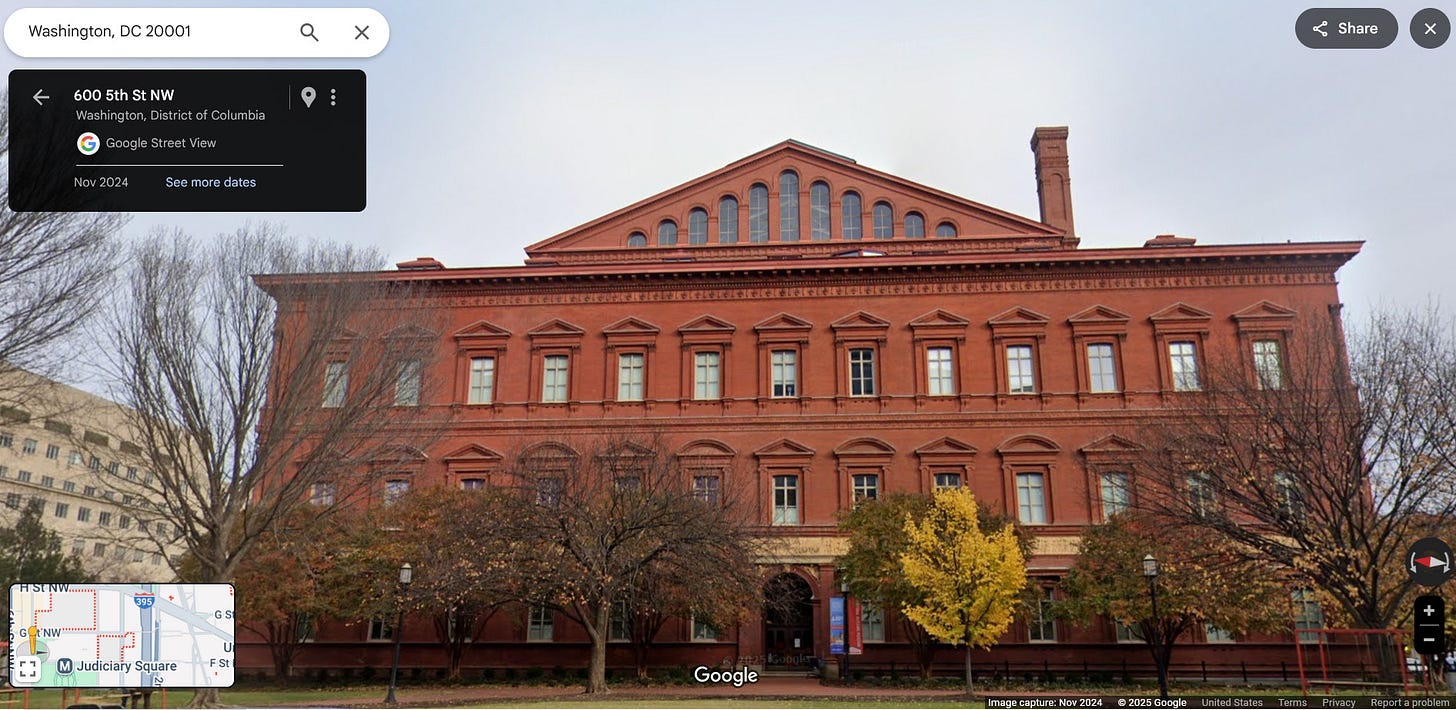I was driving along I-495, the Beltway, in Maryland one late afternoon—four lanes of heavy traffic, but moving well. There was a small straight truck just ahead of me in the lane to my left. Suddenly, something flew off of the truck and directly into my path. There was no chance of avoiding it.
I pulled off to the side of the road, got out, and looked at the front of my car. A fiberglass air deflector from under the front end of a wrecked car had blown off the truck and wedged up under the front end of my own car. The piece had done some damage to the front of my car, but I was still able to drive it, so I drove to the next exit, parked at the Royal Farms gas station on White House Rd, and called the state patrol to have an officer come and give me the police report I would need to file my insurance claim.
And I waited. And called again. And waited and waited and called again and waited some more. Finally I gave up. I took pictures, then, using my car’s jack, I pried the piece out from under my car and went home. I promptly filed a claim on my insurance to repair the damage to my car.
Roughly half of my readers are not Americans—or, at least, are not in the US—so let me explain how this insurance thing works in our train wreck of a country. Maybe it works like this everywhere. I don’t know.
Americans have decided that, as a society, we want to live in a world in which if one car smashes into another one, everybody gets their car repaired or replaced “for free.” So, if you are in an accident, you take your damaged car to an auto body shop. They fix it, and somebody else pays for it. Even if the accident was your fault. Sweet!
And who is this “somebody else?” Well, you might suppose that, since we want everybody to get their cars repaired for free, it would be the government that sends the money to the auto repair shop. But, you would be wrong. Something called an “insurance company” sends them the money.
Insurance companies are private entities whose purpose is profit, so, obviously, if they are going to pay for all six million wrecks that occur every year in the US, they need to be getting the money for that from somebody else. Where do they get it? The government? Well, no, not directly. They get it from the nation’s car owners.
By law, every car driven in the United States must “carry insurance,” which means all 225 million car owners in the United States must become a customer of one of these insurance companies in order to drive legally the car they own.1 The cost of being a customer of an auto insurance company ranges from about 50 dollars per month for “minimum coverage” to about 300 dollars per month for “full coverage.” The insurance companies pay for our wrecks out of that money after you submit a “claim.”
The idea is to spread the cost of automobile accidents around to all the drivers so no accident is financially devastating to any one driver.
Cool idea, I guess. How’s it working out for us?

I filed a claim for my accident on I-495 with my insurance company, GEICO. Subsequently, I received a letter back from them saying my claim was denied because I did not submit a police report with it. So I called GEICO’s claims department and explained that the cops had failed to show up at the scene of the accident.
They said GEICO needed proof that the cops hadn’t shown up.
How the hell can I prove that?
Not our problem. Click.
Mother-f—
I finally ended up going through the formal process of obtaining the phone records from the Maryland State Patrol showing that they had, indeed, received several calls from my phone number on the date in question. I submitted those records to GEICO.
I received a letter back from GEICO saying okay, they would accept the phone records as proof the cops hadn’t shown up, but they were going to deny my claim anyway—this time because, since I had failed to obtain the license plate number or name of the driver of the truck off which the object I had struck had fallen, I had no proof the other driver was uninsured and, therefore, the “uninsured motorist” component of my auto insurance didn’t cover the damage.
Sons-of-b—
Once again, I called GEICO’s claims department. There’s no way I could get the license plate number of that truck. We were in heavy traffic. Everybody was doing 65 - 70. The truck driver probably didn’t even know he had lost anything.
Not our prob— Wait, don’t you dare hang up on me. I am not satisfied with that response.
And so the agent and I argued long and hard. I wasn’t going to get off the phone until GEICO agreed to pay the claim.
The argument became increasingly spirited. Suddenly, another voice broke in. I’ll take it from here, Pam. Good morning, Mr. Nelsen. My name is Sheri. I’ve been listening in on your call and I believe I can help resolve your question.
Okay, well, good morning, Sheri. I actually don’t have a question. I just want you guys to pay for the damage to my car as our agreement stipulates. And so began another long and hard argument during the course of which an exasperated Sheri finally said, Mr. Nelsen, would you like me to read to you the section of your policy dealing with uninsured drivers?
Yes, please do, Sheri.
And Sheri read precisely the point I had been arguing. Her voice faltered. But before I could gleefully shriek “I told you so!” another voice broke in on the line. I’ll take it from here, Sheri. Good afternoon, Mr. Nelsen. My name is Yvonne. I’ve been listening in on your call and I believe I can help resolve your question.
Everything becomes a blur after that. GEICO never did pay for the damage to my car and Yvonne probably got a gold star next to her name on the wall in the employee break room at GEICO.
So that, foreigners, is what it’s like to be a driver in America, where everybody gets their cars fixed for free. Train wreck, meet clown world.
Insurance is what you buy so you don’t have to worry about something bad happening. It turns out no one is as worried about something bad happening as Americans.
According to Statistica, Americans—4.22 pecent of the world’s population—account for more than half of the global insurance market, consuming 1.54 trillion dollars worth of insurance every year. That’s more than 4,400 dollars for every man, woman, and child in the country. We buy health insurance, auto insurance, homeowners insurance, disability insurance, identity theft insurance, travel insurance, business liability insurance, job insurance, renters insurance, vacation insurance, commercial property insurance, commercial auto insurance, pet insurance, car rental insurance, consumer product insurance (called “extended warranties”), professional liability insurance (so professionals are free to make all the mistakes they want without having to worry about paying for them), cyber liability insurance, business interruption insurance, critical illness insurance (somehow different from health insurance), hail insurance, tornado insurance, flood insurance, hurricane insurance, earthquake insurance, crop failure insurance, kidnap, ransom, and extortion insurance, wedding liability and cancellation insurance, and surplus lines insurance (covering anything else that might go wrong, i.e., everything else we do). We even have life insurance so we don’t have to worry about dying. I predict a future in which there will be insurance insurance to cover situations like my experience with GEICO.
The unfortunate thing is that the idea behind insurance is a good one and something an advanced, high-trust society would develop.
Let’s say you live in a town of a thousand families in a thousand houses and every year on average one of those houses burns down leaving a family homeless and living under a bridge for however many years it takes to save the 10,000 dollars it costs to build a new house. So, while there is only a .1 percent chance in any given year that it will be your family’s house that burns down that year, if you live to be a hundred, there is a ten percent chance you will be homeless and living under a bridge at some point in your lifetime.
So, everybody in the town agrees to chip in ten dollars per year to a fund that pays the cost of rebuilding the home that burns down that year. The benefit is two-fold. First, you are relieved of the worry you might have to live under a bridge if your house burns down, and, second, you can live in a community that doesn’t have a permanent population of families living under bridges. Everybody’s quality of life goes up.
The problems arise when somebody says, hey, everybody, I have an idea. Instead of putting your ten dollars in the general kitty, give it to me. I’ll call myself an “insurance company” and I’ll hold the money until someone’s house burns down, then I’ll pay out the money to the victim, less a small <cough> fee for me to cover administrative costs.
Great, except with that administrative fee taken out, there’s not enough money in the kitty to rebuild the house that burned down. No problem! That insurance company is clever at money if nothing else (and he is nothing else). He simply makes the victim of the fire cover the cost of his administration fee and comes up with an impressive and insuranc-y-sounding name for what is, essentially, his profit. He calls it a “deductible.”
Humans being humans, of course, it’s easy to see how this is going to go. Soon, people are getting notices that due to blah blah, the annual contribution from all ten thousand families in the town will need to be eleven dollars instead of ten. Oh, and I’m going to stop paying to rebuild any house that burned down if the homeowner blah blah. And the deductible is going to increase, as well. And so on. Soon enough some of the homeowners say, well screw this. I’m just not going to contribute to the kitty.
But the insurance company has been getting rich and doesn’t want to see his gravy train derailed. So he hits on a brilliant plan. He takes a portion of his profits and goes to the mayor and city council and asks them to require the town’s homeowners to pay the kitty. Thanks, guys, oh—I almost forgot, here’s some bribe money, though I prefer to call it by its less illegal-sounding name, “campaign contribution.”





During the 2023-2024 election cycle, the insurance industry contributed more than $90 million dollars to federal campaigns for office and spent more than $311 million on lobbyists—professional influence peddlers—bribe brokers—at the federal level. In addition to the bribery at the federal level, there are 50 states in which officials also need bribing. Generally, state lobbying, in all states combined, runs at roughly half the total of federal lobbying.2
All told, then, during 2023-2024, insurance companies, their employees, and associated groups spent more than half a billion dollars in DC and the 50 state capitals attempting to influence policymakers to make policies that benefit the private financial interests of the guy who said, here, let me hold the money—to make that rich guy richer—to force us to be their customers.
Today, if you are an American driver, and you have any kind of interaction with the police, the first thing the cop will do is ask you for your (driver’s) license, registration (of the vehicle, which is tied to your plates), and proof of insurance—i.e., proof you are currently the customer of an insurance company. If you can’t provide that proof, the state can seize your vehicle and even put you in jail. In any case, it is going to cost you a lot of money in fines, towing fees, storage, and court costs. Essentially, the nation’s law enforcement community has become muscle for the insurance protection racket. Except that we have to pay their salaries. USA! USA! USA!
Policymakers, of course, are supposed to act in the public’s interest. So, every dollar’s worth of influence purchased by the insurance industry is a dollar’s worth of influence stolen from us. It’s a dollar spent to rig the game against us and in favor of the insurance companies. And those dollars must be effective because the insurance companies keep coming back and spending more. Year after year after year.
Today, a cop driving down the highway doesn’t even have to stop you to see whether you’re a customer of an insurance company. They can run your tags from their own vehicle to catch uninsured motorists, and I hear that in some places they have something like a bar code scanner that will automatically alert them that a passing vehicle is uninsured.
In Kansas, to get plates for your vehicle, you have to show them you’ve already paid the insurance companies for insurance on that vehicle. No insurance, no plates. No plates, no way you can drive your vehicle on a public road.
About a year ago, I obtained a camper that I was planning on fixing up and taking on the road on a kind of tour in honor of Aaron Bushnell. That project was proving beyond my rehab skills when I stumbled on a great deal on a used RV—a motor home. I sold my truck and bought it. Finally, I could get out on the road.
But I can’t get insurance. Why? Because no insurance company will insure an RV unless you also own another vehicle. I spent two weeks looking—trying every avenue. Finally, I bought something called “driver’s insurance,” which attaches to my license instead of the vehicle in hopes that that would allow me to get plates. Nope. No dice. No insurance on the vehicle, no plates on the vehicle.
There is a legal principle called “impossibility of performance” which says a law or a contract cannot require you to do something impossible. And that is exactly the situation here. The politicians pass laws requiring us to be the customers of insurance companies, but they don’t require the insurance companies to take us as customers. If the insurance companies won’t insure you, then it is impossible to be insured as required by law.
After decades of massive corruption, the laws are so skewed in favor of the rich, they’ve become impossible.
Train wreck, clown world, meet shit show.

That public men publish falsehoods Is nothing new.
That America must accept
Like the historical republics corruption and empire
Has been known for years.
Be angry at the sun for setting
If these things anger you….
Robinson Jeffers
Be Angry at the Sun (1941)
I couldn’t show you all those insurance buildings without leaving you with a beautiful building.

The one state that does not require auto insurance is New Hampshire, which requires something else. Live Free or Die, Baby.
All the information here is from the invaluable, donor supported website Open Secrets.







This trivial little detail - the caption below your photo of the Progressive building - caught my attention:
"Progressive is another top ten insurance company... Their spokesperson, Flo, speaks with an American accent, but everyone loves and trusts her because she is “down to earth” and doesn’t “put on airs,” like that gecko does with his hoity-toity British accent."
Having nothing better to do with my Sunday morning, I impulsively decided to look up "Flo", and wouldn't you know it?
"Stephanie Courtney is the actress behind the iconic character Flo in Progressive Insurance commercials. She has been playing Flo since 2008, making her one of the most recognizable faces in advertising. Flo's character, known for her bright red lipstick, bold winged eyeliner, and perky energy, has become a staple in Progressive's ad campaigns, helping to simplify and make insurance shopping an enjoyable experience for viewers. Courtney's portrayal of Flo has been so successful that she reportedly makes around $10 million per year from the role."
To my discerning eye she appears to be a Jewess of The Tribe. From her Wikipedia entry:
"Courtney was born in Stony Point, Rockland County, New York, the youngest of three children of a high-school history teacher father and a singer mother.[4][1] In 1992, she graduated with a degree in English from Binghamton University, where she played Elizabeth Proctor in The Crucible, affirming her decision to be an actress.[5] After graduation, she moved to New York City, where her roommate was future author and columnist Meghan Daum.[1] While working as a secretary for Smith Barney chairman Robert F. Greenhill, Courtney studied acting at the Neighborhood Playhouse."
Smith Barney?
"American multinational financial services corporation specializing in retail brokerage. It is the wealth & asset management division of Morgan Stanley. On January 13, 2009, Morgan Stanley and Citigroup announced that Citigroup would sell 51% of Smith Barney to Morgan Stanley, creating Morgan Stanley Smith Barney, which was formerly a division of Citi Global Wealth Management."
Robert F. Greenhill?
"Robert F. Greenhill (born 1936) is an American businessman widely credited with helping create and pioneer the modern mergers and acquisitions advisory business on Wall Street.[1][2] He is the founder and chairman of Greenhill & Co., an investment bank headquartered in New York City[1][3][4][5] which since its inception, has advised on transactions valued at close to $3 trillion and now operates in 17 offices globally across North and South America, Europe and the Middle East, and Asia and Australia."
_______________________________________________________________________________________________________
They run in packs, belong nowhere, and are essentially farming us.
What you want to do, is dig deeper. Insurance company executives typically have 2-6 homes around the country, even the smaller mutual companies. Like banks, their employees are barely paid a living wage, while these narcissistic sociopaths can literally bathe in money.
Then along comes the convid scheme, where the banks and insurers(sometimes they are both), decides to send their useless eaters to work from home, and pocketing $26,500 per employee, for not firing or laying off said useless eaters(they didn’t want to pay the mandated $100 per day travel premium per employee).
Inflation soars, causing building material prices to soar, causing double digit increases to commercial property and homeowners insurance premiums.
People cannot get new vehicles as supplies fail due to a contrived chip shortage, prices go through the roof, and insurance premiums likewise skyrocket.
Executives typically require any employee who reaches manager level, contribute a part of their salary each year to the appropriate state lobbying arm, who in turn works against policyholders.
And I’m even the most communist of states, insurance executives and their fleet of inside and outside attorneys have a cozy relationship.
Executive compensation records have to filed with the state each year, and it is a tough dig, but very enlightening.
The relationship with the insurance buying public is predatory, not unlike that group that controls banking, information, and policy at the government level.
And they lull the public and their customers back to sleep whispering sweet nothings in creepy ads; telling us they’ll put us back to our pre-loss condition.
Only if the exclusions don’t permit it and it’s between the hours of 12:00 and 12:01 on the first Sunday of each leap year.